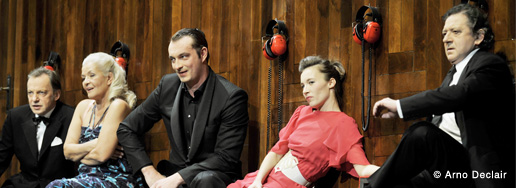F/T12 Jelinek Series: Rechnitz (Der Würgeengel)
Direction: Jossi Wieler [Switzerland]
Production: Münchner Kammerspiele [Germany]

Performing Arts Festival launching from Tokyo
First performed at the Münchner Kammerspiele from a text by Nobel Prize winner Elfriede Jelinek, "Rechnitz (Der Würgeengel)" garnered praise while also sparking controversy. Directed by Jossi Wieler, a specialist in interpreting the difficulties of Jelinekʼs texts, the production has been invited to festivals all over Europe and won Austriaʼs top Nestroy Theatre Award for a Germanlanguage play, and was named by Germanyʼs leading theatre magazine, Theater Heute, as the best play from the 2009 season. This Tokyo staging is the first time for the work to be performed outside Europe, immaculately presented by a company of actors from long-established German theatres.
Rechnitz is a small Austrian village with a population of around 3,000 people near the Hungarian border. On March 25, 1945, just 10 days before the Soviet Red Army penetrated into Austria, local Nazi collaborators and Nazi guards and secret police held a party at Rechnitz Castle. As a "party game" during the banquet, the guests shot to death around 200 Jewish forced laborers. The leader of the regional army distributed guns to selected guests, while the Jews were stripped naked, battered, shot or beaten to death.
According to court records for trials held at Vienna after the war, the owners of the castle where the tragedy occurred, the Count and Countess of Batthyany, also participated in the party. Later the couple, dubbed the "hosts of hell", fled abroad just before the Russians invaded, and never faced criminal charges.
The graves where the massacred Jewsʼ dead bodies were buried have still not been located even today. The residents of Rechnitz who knew the facts kept silent. After the war, during the process of the investigation into the incident several witnesses were killed and the details remain unclear. One resident is said to have commented: "The Jews have the Wailing Wall. In Rechnitz there is a wall of silence."
"The Exterminating Angel" (Mexico, 1962) is a key film by Spanish avant-garde director Luis Bunuel, and a work that Jelinek referenced when she composed her play about Rechnitz. The setting is a lavish banquet at a bourgeois mansion. After the meal is over, for inexplicable reasons none of the guests go home and spend the night there. In the morning, suddenly an invisible wall has appeared and no one can leave the room. Soon water and food run out and between the guests a fight for survival begins. Through an extreme situation, the real nature of these upper class people is exposed in this sharply satirical film.
In "Rechnitz (Der Würgeengel)" 5 people appear on stage. They are not directly connected with the Rechnitz village incident. They take the stance of "reporters". And yet these messengers try to talk in a way that words cannot express. But, like the people in the night party from "The Exterminating Angel", they have lost the path to leave. In the speeches the emissaries give trying to grasp the features of the incident, repetition, variation and contradictions proliferate, becoming lost in deviations and linguistic traps. Whether they are reporters, perpetrators, victims or observers is not clear, and the distinction between the doer and victim becomes harder to see. As the stances, utterances and linguistic nuances of the involved parties stratify, so the messengers retreat into verbose silence. This is the rampant "wall of silence" that has been constructed in the village of Rechnitz even until today.
In order to get closer to the atmosphere disguising the incident, Jelinek removed layer after layer of the events, performing the work of exhumation through language. Rather than restaging a historical massacre in a narrative form, Jelinek spun the details of the incident like a roulette wheel in a casino of ideas. Utilizing language from all the perspectives of vocabulary, language structure and context, she exposes the ideological essence of words. As the compositional words stratify like a fugue, it gives birth to a trompe l'oeil.
The terror of what happened at Rechitz Castle will never be conveyed to its core no matter what words you use to express it.However, precisely because it continues to be blurred, a text such as Jelinekʼs emerges with its complex and stratified imagery, assaulting audiences with numerous questions about the massacre that perpetuate in your head. How can we deal with this history? How can we narrate about the past? How should we talk about it? And how do we want to?
Swiss-born director Jossi Wieler has a reputation for taking classical texts and interpreting them through a way suitable for the era, finding styles to stage them that explore the original texts more deeply. Not only theatre, he also shows audiences fresh perspectives on opera works as well. While sincerely facing up to history, Wielerʼs work also shows a rare contemporary talent.